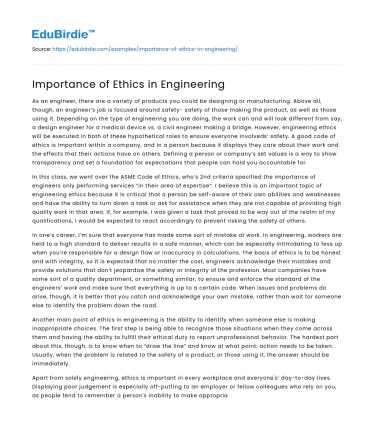As an engineer, there are a variety of products you could be designing or manufacturing. Above all, though, an engineer’s job is focused around safety- safety of those making the product, as well as those using it. Depending on the type of engineering you are doing, the work can and will look different from say, a design engineer for a medical device vs. a civil engineer making a bridge. However, engineering ethics will be executed in both of these hypothetical roles to ensure everyone involveds’ safety. A good code of ethics is important within a company, and in a person because it displays they care about their work and the effects that their actions have on others. Defining a person or company’s set values is a way to show transparency and set a foundation for expectations that people can hold you accountable for.
In this class, we went over the ASME Code of Ethics, who’s 2nd criteria specified the importance of engineers only performing services “in their area of expertise”. I believe this is an important topic of engineering ethics because it is critical that a person be self-aware of their own abilities and weaknesses and have the ability to turn down a task or ask for assistance when they are not capable of providing high quality work in that area. If, for example, I was given a task that proved to be way out of the realm of my qualifications, I would be expected to react accordingly to prevent risking the safety of others.
Save your time!
We can take care of your essay
- Proper editing and formatting
- Free revision, title page, and bibliography
- Flexible prices and money-back guarantee
In one’s career, I’m sure that everyone has made some sort of mistake at work. In engineering, workers are held to a high standard to deliver results in a safe manner, which can be especially intimidating to fess up when you’re responsible for a design flaw or inaccuracy in calculations. The basis of ethics is to be honest and with integrity, so it is expected that no matter the cost, engineers acknowledge their mistakes and provide solutions that don’t jeopardize the safety or integrity of the profession. Most companies have some sort of a quality department, or something similar, to ensure and enforce the standard of the engineers’ work and make sure that everything is up to a certain code. When issues and problems do arise, though, it is better that you catch and acknowledge your own mistake, rather than wait for someone else to identify the problem down the road.
Another main point of ethics in engineering is the ability to identify when someone else is making inappropriate choices. The first step is being able to recognize those situations when they come across them and having the ability to fulfill their ethical duty to report unprofessional behavior. The hardest part about this, though, is to know when to “draw the line” and know at what point, action needs to be taken. Usually, when the problem is related to the safety of a product, or those using it, the answer should be immediately.
Apart from solely engineering, ethics is important in every workplace and everyone's’ day-to-day lives. Displaying poor judgement is especially off-putting to an employer or fellow colleagues who rely on you, as people tend to remember a person's inability to make appropriate decisions. ME 300 taught that the best way to avoid making unethical decisions is to make a list of things they will never do, as a way to recognize when you’re heading towards making poor choices. In the workplace, it is essential to be open and honest with stakeholders and employees about the advancement of the company because people respect leaders who display transparency. A manager has a large influence on the culture that they set forth; For example, management that shows actions of poor judgement and malpractice is much more likely to be disrespected and stood up against. This completely defeats the purpose of those in authority because employees generally refuse to be directed by people they can’t trust.
I plan to adhere to the ASME Code of Ethics throughout my career, as it is an important basis for showing integrity to my profession. As an engineer, I will carefully think over my decisions and constantly question if my actions are affecting the safety of others. I recognize that an engineer’s judgement has to be very well-trusted to do the work expected of us. My ‘list’ of things I will never do contains actions like disclosing confidential information, discriminating against people in the workplace and disrespecting intellectual property of others. Avoiding unethical mistakes like these will overall help me to be an honorable profession and hopefully communicate to others that I can be seen as a role model.






 Stuck on your essay?
Stuck on your essay?

